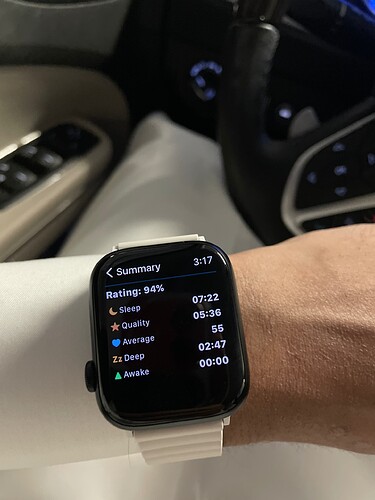Sleep happens in cycles of 90 minutes.
The first few minutes is the lead-in, then comes the light sleep during which the body temperature and heart rate drop and the muscles relax. The eyes stop moving. This second stage starts out lasting less than 30 minutes but increases (at the expense of deep sleep) and commonly makes up about half of your total sleep. Waking up during this stage may give you a desire to hit the snooze button but it’s the place when most people wake (hence 8 hours and not 7.5).
The third stage is deep sleep. The body relaxes even further and brainwaves reach into delta. This is also when the body physically heals. This stage starts out around 30 minutes but decreases as time goes by. It is also suggested this is when you do most of your subconscious problem-solving and memory archiving. Waking up during this stage makes you groggy and makes it difficult to focus for the 20 minutes you spent on your morning routine.
Finally, the REM sleep kick in. The brain activity picks up, eyes start moving rapidly and we experience sleep paralysis. This stage is when dreams are the most vivid and real (which is likely why the body paralysis happens). Dreams can happen during any stage but are most often experienced here. During the first 90-minute cycle REM only lasts a few minutes, but as the deep sleep decreases in later cycles, the REM stage increases. Waking up during this stage is slightly confusing. At first you remain in your dream before you realize you are dreaming. Then you gently become aware of where you are. Waking too fast may not give the body time to turn off the sleep paralysis and can be quite scary. However, since this is the last part of the cycle this is when you naturally wake, remembering your last dream as it slowly fades.
With every one of these 90 minutes cycles, the REM should increase, while light and deep sleep fight for the remaining time. Which wins depends on many factors, some listed below. As a result, the more of these cycles you go through the bigger the benefits (although sleeping too much is not too good either and will actually make you tired).
Most people need between 3 and 6 90-minute cycles to operate normally, depending on many factors. People locked in a bunker without being aware of the day-night cycle ended up sleeping around 5 hours every 24 during an experiment. People who don’t work and just relax all day also sleep less compared to people who need to use their brain or body all day, which is why you can often get away with sleeping less when not working but become exhausted at work with the same amount of sleep even though you wake up thinking you’re rested enough.
Devices like watches will likely monitor heart rate changes and body movement. More advanced ones and the Oura also monitor changes in body temperature and HRV. EEG devices like the Muse monitor heart rate combined with brainwaves for the most accurate reading (as long as it doesn’t move too much).
If you eat too late your digestion is still going while you sleep and your heart rate and body temperature will only drop during later cycles. This prevents many of the beneficial parts of the earlier cycles. The Oura is very good at complaining about that. Over-exercising may have similar effects because the body is under stress which prevents the heart (and other muscles) from relaxing.
As you get older, deep sleep gets less and this has been suggested to be a partial cause for the slower healing and gradual degradation of the body. There are people actively experimenting with trying to increase their deep sleep as a tool to stay younger and increase their healing and muscle growth.
Fasting also tends to increase deep sleep. About 25% tends to be normal. During fasting, 30-40% is not uncommon. This takes part of the REM sleep but mostly takes from light sleep.
If you don’t get enough sleep, it would result in REM and deep sleep being below 25% of your total. Bad sleeping patterns like these as well as irregular sleeping patterns may cause you to spent the majority of the night in light sleep, with only a very small part in deep sleep and REM. Dreams are harder to come by, usually you’ll feel blank upon waking, like you spent the entire night in stasis. Not necessarily tired (you may even feel like you’ve seldom slept so deep in your life in cases of sleep debt), although there may be more yawning throughout in the day.
It has been suggested if REM were not to occur that you will eventually die. Some esoteric beliefs state this is when you reach into the Astral Plane since that’s where dreams take place. Although some claim it is possible, I am very curious if it is possible to replace sleep with deep meditation.
Those practicing polyphasic sleeping patterns might spend the majority of their sleep in deep and REM because their body doesn’t have time for anything else. Similarly, one method of inducing lucid dreaming is to wake up in the middle of the night, be up and about for a short time, then go back to bed. This interrupted sleeping tends to skip the first few stages and drop right back in, much like how a classic hypnotic induction will bring you out of trance, then a finger-snap to go deeper, over and over. When you have a day off, set your alarm at 5 in the morning, then wake up, turn it off and make a conscious choice to go back to sleep. Tends to feel really good and you may experience going deep right away.
This was another possibly unnecessarily long DarkPhilosopher post.




